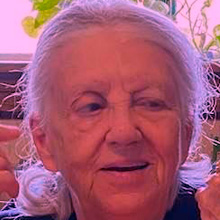Tengo que presentar a una colega ahora para este vis a vis y no estoy seguro cómo presentarla. Si lo hago formalmente, debo decir que es un narradora y periodista cubana que ha hecho humor toda su vida y ha investigado también. Por ejemplo publicó “La prensa satírica habanera del siglo XIX”, un ensayo excelente. Escribe cuentos, minicuentos, artículos. Colaboró con sus textos durante años en la publicación humorística cubana “Palante”. Y ha publicado ocho magníficos libros. Así presento a la humorista literaria cubana Évora Tamayo.
Pero como la conozco, como soy su amigo y como la quiero mucho, la presentaré también informalmente: es un huracán. No para de hacer reír. Es un espectáculo verla argumentar, escuchar sus metáforas, sus hipérboles, sus ilustraciones de ejemplos, su manera de opinar, etc. Eso la hace ser una persona excepcional. Y como guinda de la torta, agrego que es sensible, leal, entregada, generosa, noble. En fin, un honor y un privilegio haberla conocido y sobre todo tenerla como una gran amiga.
Después de estas dos presentaciones, vamos ya al vis a vis que establecimos para publicarlo en Humor Sapiens.
PP: Amiga mía, ¿te gusta que te hagan entrevistas?
EVORA: Por supuesto que no. A mí me gustan las buenas comidas y los buenos días. En las entrevistas siempre queremos actuar como si fuéramos trascendentes e importantes. ¡Qué horror!
PP: Ja, ja, bueno, responde de forma natural y olvídate de todo. Además, tú no te tienes que hacer “la trascendental”, porque lo eres, lo quieras o no. Te sugiero que no tomes esto como una entrevista, sino como una conversación relajada entre amigos, ¿de acuerdo? Comienzo entonces, dime, en este año 2009, ¿cómo ves el estado del humor en Estados Unidos, donde vives, en televisión, radio, teatro, literatura y gráfica?
EVORA: Si fuera políticamente correcta y expresara que aquí en USA, el humor es el deshumor, que nadie se ríe y que todos los programas desde la tele, el radio, el cine, la televisión, el internet, y hasta en la Casa Blanca, son tristes y miserables, vulgares y chabacanos, bla, bla, bla... quedaría muy bien. Pero no es cierto. Así que no lo digo. ¡Sorry!
PP: Bueno, eso de “políticamente correcto” corre solo para algunos. No hay que ser experto para saber que en todos (o casi todos) los países hay humor bueno y humor malo. Hay gente que ríe y gente que no. Mi intención era que dieras una foto instantánea de la situación actual. Así que aquí puedes responder abiertamente como lo desees. Aquí no hay política correcta (creo ni siquiera hay política incorrecta). Pero seguimos en esa línea. Tú sabes que en varios países de América Latina se dice: "Mi país es un pueblo de humoristas", "en mi país, tú mueves una piedra y sale un humorista", etc. ¿En USA se dice lo mismo?
EVORA: Realmente, no se dedican a esas pajarerías nacionalistas y cretinas.
PP: Ja, ja, “pajarerías”. Hacía rato que no leía o escuchaba esa palabra. ¿Te digo algo? Por lo que he visto, a veces el nacionalismo no es la causa de esas expresiones, sino el complejo de inferioridad y hasta el uso del escudo para ocultar otras cosas. Pero en fin… Otra pregunta, querida amiga, ¿es verdad la acuñada frase: "Es más fácil hacer llorar que hacer reír?
EVORA: Depende de quien ponga el muerto.
PP: Te veo muy poco locuaz hoy. Pero está bien. Dime una cosa, ¿cuándo decidiste hacerte humorista?
EVORA: Hay decisiones que nunca nos pesa.
PP: ¿Ves que eres "trascendentalista"?, Ja, ja. Te pones a filosofar ahora. Claro que no te puede pesar haber escogido el humor en tu vida, pero quería que mis lectores supieran cuándo lo decidiste. Otra cosa: ¿el humorista nace o se hace?
EVORA: Creo que se nace con ese sentido especial de ver una cuarta dimensión, pero en el curso de la profesión se puede aprender mucho leyendo y observando como pasa la vida por delante tus narices, para luego ir a parar a la mar...
PP: ¡Y ahora respuestas poéticas! Me gustó. Y también me gustó que respondieras argumentando. ¿Cuál ha sido el mejor y el peor momento de su carrera en el humor hasta el día de hoy?
EVORA: Si se trata de una carrera, pues todavía estoy corriendo. Cierto que solamente recuerdo buenos momentos. Y mucha gente que me acompañó en esa carrera e hicieron todavía mejor los buenos momentos.
PP: Claro que aún corres. Y ha sido una preciosa y fructífera carrera, amiga mía. Y me alegra que solo recuerdes los buenos momentos. Como profesional del humor, ¿te ríes fácil? ¿Con qué tipo de chistes?
EVORA: Me río mucho. Ahora leo Chiquita, novela de Antonio Orlando y me hace reír continuamente. Prefiero el humor más inteligente, pero me arrastro de risa con un chascarrillo. Soy muy sana.
PP: Muy buena la novela de Antonio Orlando. Yo estuve en el equipo de la Editorial Alfaguara cuando la lanzó en Chile. Y doy fe que eres muy sana. ¿Podrías contarnos alguna anécdota relacionada con tu trabajo en el humor?
EVORA: Bueno, resulta que muchas personas pensaban que Evora era un hombre....y se sorprendían al descubrir que soy una mujer. Todavía no sé si es anecdótico o discriminatorio.
PP: Ja, ja. Bueno, si primero conocieron al actor César Évora, podría suceder eso. Pero en mi caso fue al revés. Me sorprendió el apellido de César cuando ya te conocía y te admiraba. ¿Y con cuáles colegas te identificas más?
EVORA: Este año Mingote cumple 90 años de hacer humor. Hay que aplaudirlo. Fontanarrosa, H. Zumbado, Betán, Alben, Willy Coopy, Gogol, Chejov... Son tantos los nombres que nos ponen el alma a divertir... Esta es una respuesta interminable.
PP: Bueno, me diste suficientes nombres para saber tus gustos. Y ahora para cerrar, ¿qué le aconsejarías a un humorista? A mí, por ejemplo.
EVORA: En la anterior lista me faltaba un nombre: Pepe Pelayo. Sigue siéndolo y esa es tu carta de triunfo.
PP: Un honor tu generosidad. Mil gracias, querida amiga. Y agradecidísimo por dedicarme tu tiempo y tu atención. Te deseo mucha salud y muchos éxitos más. Te quiero siempre.
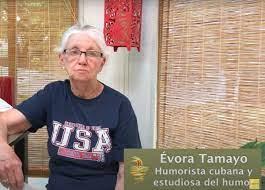
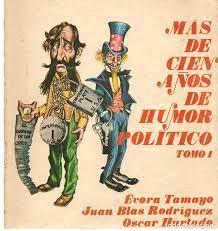
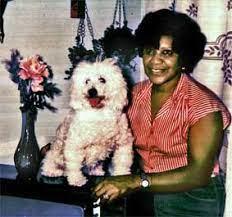
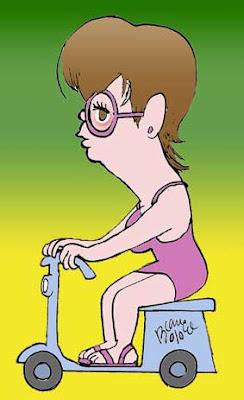
Interview with Évora Tamayo
By Pepe Pelayo
I prefer smarter humor
I have to introduce a colleague now for this “dialogue” and I'm not sure how to introduce her. If I do it formally, I must say that he is a Cuban narrator and journalist who has done humor all his life and has also investigated. For example, he published “The Havana satirical press of the 19th century,” an excellent essay. Write stories, short stories, articles. He collaborated with his texts for years in the Cuban humorous publication “Palante”. And he has published eight magnificent books. This is how I present the Cuban literary humorist Évora Tamayo.
But since I know her, since I am her friend and since I love her very much, I will also introduce her informally: she is a hurricane. It doesn't stop making you laugh. It is a spectacle to see her argue, listen to her metaphors, her hyperboles, her illustrations of examples, her way of giving her opinions, etc. That makes her an exceptional person. And as icing on the cake, I add that she is sensitive, loyal, dedicated, generous, noble. In short, an honor and a privilege to have known her and above all to have her as a great friend.
After these two presentations, we are now going to the “dialogue” that we established to publish it in Humor Sapiens.
PP: My friend, do you like being interviewed?
EVORA: Of course not. I like good meals and good days. In interviews we always want to act as if we were transcendent and important. How awful!
PP: Well, answer naturally. Furthermore, you don't have to act “transcendental”, because you are, whether you want it or not. I suggest you don't take this as an interview, but as a relaxed conversation between friends, okay? Let me begin then, tell me, in this year 2009, how do you see the state of humor in the United States, where you live, on television, radio, theater, literature and graphics?
EVORA: If I were politically correct and expressed that here in the USA, humor is lack of humor, that no one laughs, and that all the programs on TV, radio, cinema, television, the Internet, and even in the White House , they are sad and miserable, vulgar and tacky, blah, blah, blah... it would be very good. But it's not true. So I don't say it. Sorry!
PP: Well, that “politically correct” thing applies only to some. You don't have to be an expert to know that in all (or almost all) countries there is good humor and bad humor. There are people who laugh and people who don't. My intention was for you to give a snapshot of the current situation. So here you can answer openly as you wish. There is no correct policy here (I don't think there is even wrong policy). But we continue along that line. You know that in several Latin American countries it is said: "My country is a town of comedians", "in my country, you move a stone and a comedian comes out", etc. Is the same thing said in the USA?
EVORA: Really, they don't engage in that nationalist and cretinous birding.
PP: Ha ha, “birdhouses.” I hadn't seen that word in a while. I tell you something? From what I have seen, sometimes nationalism is not the cause of these expressions, but the inferiority complex and even the use of the shield to hide other things. But anyway... Another question, dear friend, is the coined phrase true: "It is easier to make people cry than to make them laugh?"
EVORA: It depends on who puts the dead man.
PP: I see you very little talkative today. But it's okay. Tell me something, when did you decide to become a comedian?
EVORA: There are decisions that never weigh on us.
PP: Do you see that you are a “transcendentalist”? Ha ha. You start philosophizing now. Of course you may not regret having chosen humor in your life, but I wanted my readers to know when you decided. Another thing: is a comedian born or made?
EVORA: I think you are born with that special sense of seeing a fourth dimension, but in the course of the profession you can learn a lot by reading and observing how life passes by your nose, and then ends up in the sea...
PP: And now poetic answers! I liked. And I also liked that you responded with an argument. What has been the best and worst moment of your comedy career to date?
EVORA: If it's a race, well I'm still running. It's true that I only remember good moments. And many people who accompanied me in that race and made the good times even better.
PP: Of course you still run. And it has been a beautiful and fruitful career, my friend. And I'm glad you only remember the good times. As a humor professional, do you laugh easily? With what kind of jokes?
EVORA: I laugh a lot. Now I read Chiquita, a novel by Antonio Orlando and it makes me laugh continuously. I prefer smarter humor, but I laugh at a joke. I am very healthy.
PP: Antonio Orlando's novel is very good. I was on the team at Editorial Algauara when it launched it in Chile. And I attest that you are very healthy. Could you tell us an anecdote related to your work in comedy?
EVORA: Well, it turns out that a lot of people thought Evora was a man....and were surprised to find out that I'm a woman. I still don't know if it's anecdotal or discriminatory.
PP: Ha ha. Well, if they met the actor César Évora first, that could happen. But in my case it was the other way around. I was surprised by César's last name when I already knew you and admired you. And with which colleagues do you identify?
EVORA: This year Mingote celebrates 90 years of doing humor. It must be applauded. Fontanarrosa, H. Zumbado, Betan, Alben, Willy Coopy, Gogol, Chejov... There are so many names that make our souls entertain... This is an endless answer.
PP: Well, you gave me enough names to know your tastes. And now to close, what would you advise a comedian? To me, for example.
EVORA: In the previous list I was missing a name: Pepe Pelayo. Remain that way and that is your trump card.
PP: Your generosity is an honor. Thank you very much, dear friend. And very grateful. For giving me your time and attention. I wish you good health and many more successes. I love you always.
(This text has been translated into English by Google Translate)

